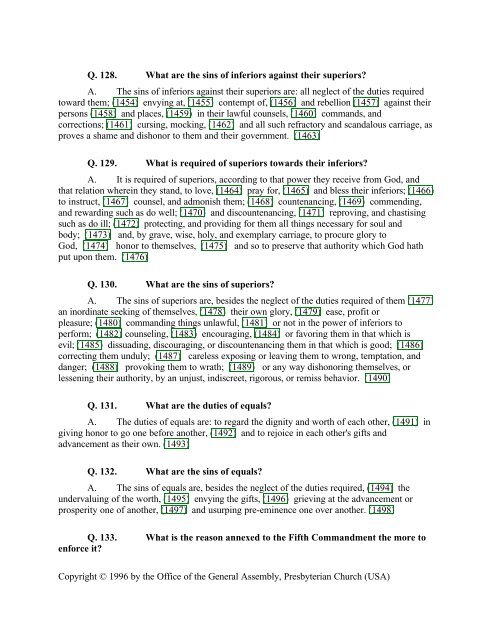The Book of Confessions - The Presbyterian Leader
The Book of Confessions - The Presbyterian Leader
The Book of Confessions - The Presbyterian Leader
You also want an ePaper? Increase the reach of your titles
YUMPU automatically turns print PDFs into web optimized ePapers that Google loves.
Q. 128. What are the sins <strong>of</strong> inferiors against their superiors?<br />
A. <strong>The</strong> sins <strong>of</strong> inferiors against their superiors are: all neglect <strong>of</strong> the duties required<br />
toward them; (1454) envying at, (1455) contempt <strong>of</strong>, (1456) and rebellion (1457) against their<br />
persons (1458) and places, (1459) in their lawful counsels, (1460) commands, and<br />
corrections; (1461) cursing, mocking, (1462) and all such refractory and scandalous carriage, as<br />
proves a shame and dishonor to them and their government. (1463)<br />
Q. 129. What is required <strong>of</strong> superiors towards their inferiors?<br />
A. It is required <strong>of</strong> superiors, according to that power they receive from God, and<br />
that relation wherein they stand, to love, (1464) pray for, (1465) and bless their inferiors; (1466)<br />
to instruct, (1467) counsel, and admonish them; (1468) countenancing, (1469) commending,<br />
and rewarding such as do well; (1470) and discountenancing, (1471) reproving, and chastising<br />
such as do ill; (1472) protecting, and providing for them all things necessary for soul and<br />
body; (1473) and, by grave, wise, holy, and exemplary carriage, to procure glory to<br />
God, (1474) honor to themselves, (1475) and so to preserve that authority which God hath<br />
put upon them. (1476)<br />
Q. 130. What are the sins <strong>of</strong> superiors?<br />
A. <strong>The</strong> sins <strong>of</strong> superiors are, besides the neglect <strong>of</strong> the duties required <strong>of</strong> them (1477)<br />
an inordinate seeking <strong>of</strong> themselves, (1478) their own glory, (1479) ease, pr<strong>of</strong>it or<br />
pleasure; (1480) commanding things unlawful, (1481) or not in the power <strong>of</strong> inferiors to<br />
perform; (1482) counseling, (1483) encouraging, (1484) or favoring them in that which is<br />
evil; (1485) dissuading, discouraging, or discountenancing them in that which is good; (1486)<br />
correcting them unduly; (1487) careless exposing or leaving them to wrong, temptation, and<br />
danger; (1488) provoking them to wrath; (1489) or any way dishonoring themselves, or<br />
lessening their authority, by an unjust, indiscreet, rigorous, or remiss behavior. (1490)<br />
Q. 131. What are the duties <strong>of</strong> equals?<br />
A. <strong>The</strong> duties <strong>of</strong> equals are: to regard the dignity and worth <strong>of</strong> each other, (1491) in<br />
giving honor to go one before another, (1492) and to rejoice in each other's gifts and<br />
advancement as their own. (1493)<br />
Q. 132. What are the sins <strong>of</strong> equals?<br />
A. <strong>The</strong> sins <strong>of</strong> equals are, besides the neglect <strong>of</strong> the duties required, (1494) the<br />
undervaluing <strong>of</strong> the worth, (1495) envying the gifts, (1496) grieving at the advancement or<br />
prosperity one <strong>of</strong> another, (1497) and usurping pre-eminence one over another. (1498)<br />
Q. 133. What is the reason annexed to the Fifth Commandment the more to<br />
enforce it?<br />
Copyright © 1996 by the Office <strong>of</strong> the General Assembly, <strong>Presbyterian</strong> Church (USA)




